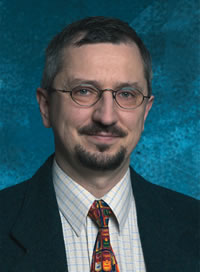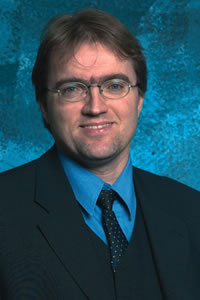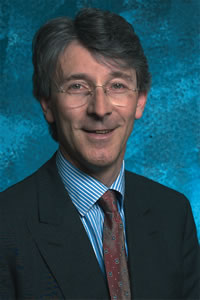

GD — Society for Dermopharmacy
 |
Issue 2 (2002) |
Dermopharmacy News
3rd Symposium
“Health Economy in Dermatology”
Pharmaco-economy,
Quality of Life and Quality Management in Clinic and Practice
Report by Thomas
Müller-Bohn, Süsel
On 22 March 2002, 3rd Symposium "Health Economy in Dermatology"
took place in the frame of 6th Annual Meeting of the Gesellschaft für
Dermopharmazie. The conference organized by the University Dermatological
Clinic Freiburg in a two-year interval has been integrated in the program
of the GD's Annual Meeting for the first time. As co-event it emphasized
the interdisciplinary character both of the Annual Meeting and the GD.
The program covered topics from the conception of pharmaco-economic studies
to experience from the practice and current events in the Public Health
sector.
The venue Hamburg was a special opportunity for the university Dermatological Clinic Freiburg to honour its director Professor Dr. med. Erwin Schöpf on the occasion of his retirement in a very personal way. The scientific career of the former president of the Deutsche Dermatologische Gesellschaft (DDG) [German Dermatological Society] had commenced in Hamburg. Schöpf had initiated health economical studies at the Freiburg Dermatological University. These had been in particular implemented by private lecturer Dr. med. Matthias Augustin, who also headed the symposium.
 Professor Dr. Oliver Schöffski dealt with the general significance of health economy in his lecture. |
Economic Orientation:
Avenues and Misleading Routes
Why does health economy continuously gain in importance? According to the health economist professor Dr. Oliver Schöffski, Nuremberg, the reason lies in the discrepancy of the considerable medicinal possibilities and the shortage of financial means in the Public Health sector. In contrast to medicine, which is able to heal patients, the shortage problem can never be resolved in principle. Moreover, there is no scientifically founded solution regarding the amount of money, which should be destined for the Public Health System. Contribution stability according to Dr. Schöffski is a mere politically motivated postulate. This is why there is an increasing significance of pharmaco-economic studies comparing the benefit of new therapies with additional costs.
New legal stipulations such as the diagnosis-oriented Fallpauschalen (DRGs) [lump sum per case] and the positive list are in contrast, according to the opinion of private lecturer Dr. med. Matthias Augustin, of problematic nature. The imminent turnover losses by the DRGs will lead to restructuration in the hospital and alter the medical care of patients. In the recommendation list concerning the positive list, numerous dermatics have been excluded which are economically reasonable according to Augustin's opinion and contain dermatologically necessary active agents or active agent combinations.

Quality of Life as Standard of
Pharmaco-economic Studies
Regarding the conception of pharmaco-economic studies, Augustin explained, that equally particular significance is attached on the quality of life. He referred to the DDG-guidelines for the assessment of quality of life in dermatology and announced that this subject is also dealt with in the department Dermatotherapy of the GD, headed by him. At present the department sets a focus on the assessment of quality of life at psoriasis.
Important insights for dermatology are also supplied by epidemiology, as professor Dr. med. Thomas Diepgen, Heidelberg, explained. It particularly supports the prevention, which is in most cases ethically or economically superior to a following therapy. Dr. med. Claus Lori-Lindner, Munich, reported about a variety of international recommendations for pharmaco-economical studies and emphasized that the statements partly differ distinctly from each other or are even contradictory regarding methodology of the studies.
Problems in Clinic
and Practice
Numerous brief lectures of the symposium dealt in particular with experience from practice as well as the current developments in health politics. Thus for example Professor Dr. med. Wolfgang Vanscheidt, Freiburg, suggested to increasingly integrate dermatological practices in clinical studies. This improves the opportunity to recruit patients suffering from rather minor dermatological diseases who normally not undergo in-patient treatments.
Ruth Weber, Freiburg has worked out that dermatological clinics have to reckon with a decrease of the proceeds of more than 50 percent after introduction of the DRGs at dermatoses such as psoriasis and atopical dermatitis. Professor Dr. med. Eckard-Wilhelm Breitbart, Buxtehude, showed an optimistic view as to the decline in proceeds may possibly be covered by an extension of the ambulant dermatological rehabilitation. For an efficient rehabilitation the patient would however have to be attended not only dermatologically but also psychologically, pedagogically and ecotrophologically by an interdisciplinary team.
 Lecturer Dr. med. Matthias Augustin was the scientific head of the symposium. |
The secretary-general of the Berufsverband der Deutschen Dermatologen (BVDD) [Professional Association German Dermatologists], Dr. Michael Reusch, Hamburg, complained of the constantly decreasing case value in dermatology. The latter is meanwhile according to Reusch, in most federal states not even half the value as a case of a general practitioner. Thus on a long-term there is no longer a basis for a qualified treatment and all the more for investment in the practice.
Criticism at Guidelines
and Aut-idem Regulation
An additional problem posing to the practising dermatologist is the practical implementation of medicinal guidelines, as Dr. med. Klaus Strömer, Möchengladbach outlined. In theory, guidelines are to improve the attendance of patients as well as the quality management, however, in fact among the approximately more than 1000 existing guidelines or drafts in Germany there are numerous ones which have themselves considerable quality faults and/or do not contain any indication as to cost-benefit relations.
 Dr. med. Michael Reusch deplored the continuously decreasing case value in Dermatology. |
The symposium participants also criticized the aut-idem regulation passed by the legislator. The present dermatologists, pharmacists and representatives of the pharmaceutical industry agreed that active-substance identical topical dermatics without bio-equivalence proof are not exchangeable and therefore have to be excluded from the aut-idem regulation.
(A more detailed article by Thomas-Müller Bohn about the symposium is contained in the German issue 2/2002 of this e-journal of DermoTopics: www.dermotopics.de).
top